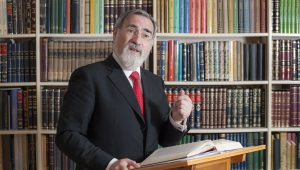
https://www.facebook.com/rabbisacks/videos/333765660801722/
While the Creation narrative clearly established God as Master of the Universe, it also appointed humankind as Master of the Earth.
Tu B’Shvat, the Jewish new year for trees, begins this Sunday evening and is a time when we remember our responsibilities to the environment.
Tu B’Shvat sameach!

Few texts have had a deeper influence on Western civilisation than the first chapter of Genesis, with its momentous vision of the universe coming into being as the work of God. Set against the grandeur of the narrative, what stands out is the smallness yet uniqueness of humans, vulnerable but also undeniably set apart from all other beings.
The words of the Psalmist echo the wonder and humility that the primordial couple must have felt as they beheld the splendour of creation:
“When I consider your heavens,
The work of your fingers,
The moon and the stars,
Which you have set in place.
What is humanity that you are mindful of it,
The children of mortals that you care for them?
Yet you have made them little lower than the angels
And crowned them with glory and honour.”
The honour and glory that crowns the human race is possession of the earth, which is granted as the culmination of God’s creative work: “Be fruitful and multiply, fill the earth and subdue it.” This notion is fortified in Psalm 115: “The heavens are the Lord’s heavens, but the earth God has given to humanity.” While the creation narrative clearly establishes God as Master of the Universe, it is the human being who is appointed master of the earth.
Grappling with the challenging notion of humans as divinely-ordained owners and subduers of the earth, we come face to face with the fundamental questions of our place in the universe and our responsibility for it. A literal interpretation suggests a world in which people cut down forests, slaughter animals, and dump waste into the seas at their leisure, much like we see in our world today.
On the other hand, as Rav Kook, first Chief Rabbi of Israel, writes, any intelligent person should know that Genesis 1:28, “does not mean the domination of a harsh ruler, who afflicts his people and servants merely to fulfil his personal whim and desire, according to the crookedness of his heart.” Could God have really created such a complex and magnificent world solely for the caprice of humans?
Genesis chapter 1 is only one side of the complex biblical equation. It is balanced by the narrative of Genesis chapter 2, which features a second Creation narrative that focuses on humans and their place in the Garden of Eden. The first person is set in the Garden “to work it and take care of it.”
The two Hebrew verbs used here are significant. The first – le’ovdah – literally means “to serve it.” The human being is thus both master and servant of nature. The second – leshomrah – means “to guard it.” This is the verb used in later biblical legislation to describe the responsibilities of a guardian of property that belongs to someone else. This guardian must exercise vigilance while protecting, and is personally liable for losses that occur through negligence. This is perhaps the best short definition of humanity’s responsibility for nature as the Bible conceives it.
We do not own nature – “The earth is the Lord’s and the fullness thereof.” (Psalm 24:1) We are its stewards on behalf of God, who created and owns everything. As guardians of the earth, we are duty-bound to respect its integrity.
The mid-nineteenth century commentator Rabbi Samson Raphael Hirsch put this rather well in an original interpretation of Genesis 1:26, “Let us make the human in our image after our own likeness.” The passage has always been puzzling, since the hallmark of the Torah is the singularity of God. Who would God consult in the process of creating humans?
The “us,” says Hirsch, refers to the rest of creation. Before creating the human, a being destined to develop the capacity to alter and possibly endanger the natural world, God sought the approval of nature itself. This interpretation implies that we would use nature only in such a way that is faithful to the purposes of its Creator and acknowledges nature’s consenting to humanity’s existence.
The mandate in Genesis 1 to exercise dominion is, therefore, not technical, but moral: humanity would control, within our means, the use of nature towards the service of God. Further, this mandate is limited by the requirement to serve and guard as seen in Genesis 2. The famous story of Genesis 2-3 – the eating of the forbidden fruit and Adam and Eve’s subsequent exile from Eden – supports this point.
Not everything is permitted. There are limits to how we interact with the earth. The Torah has commandments regarding how to sow crops, how to collect eggs, and how to preserve trees in a time of war, just to name a few. When we do not treat creation according to God’s Will, disaster can follow.
We see this today as more and more cities sit under a cloud of smog and as mercury advisories are issued over large sectors of our fishing waters. Deforestation of the rainforests, largely a result of humanity’s growing demand for timber and beef, has brought on irrevocable destruction of plant and animal species.
We can no longer ignore the massive negative impact that our global industrial society is having on the ecosystems of the earth. Our unbounded use of fossil fuels to fuel our energy-intensive lifestyles is causing global climate change. An international consensus of scientists predicts more intense and destructive storms, floods, and droughts resulting from these human-induced changes in the atmosphere. If we do not take action now, we risk the very survival of civilisation as we know it.
The Midrash says that God showed Adam around the Garden of Eden and said, “Look at my works! See how beautiful they are – how excellent! For your sake I created them all. See to it that you do not spoil and destroy My world; for if you do, there will be no one else to repair it.”
Creation has its own dignity as God’s masterpiece, and though we have the mandate to use it, we have none to destroy or despoil it. Rabbi Hirsch says that Shabbat was given to humanity “in order that he should not grow overweening in his dominion” of God’s creation. On the Day of Rest, “he must, as it were, return the borrowed world to its Divine Owner in order to realize that it is but lent to him.”
Ingrained in the process of creation and central to the life of every Jew is a weekly reminder that our dominion of earth must be l’shem shamayim – in the name of Heaven.
The choice is ours. If we continue to live as though God had only commanded us to subdue the earth, we must be prepared for our children to inherit a seriously degraded planet, with the future of human civilisation put into question.
If we see our role as masters of the earth as a unique opportunity to truly serve and care for the planet, its creatures, and its resources, then we can reclaim our status as stewards of the world, and raise our new generations in an environment much closer to that of Eden.

An international religious leader, philosopher, award-winning author and respected moral voice, Rabbi Lord Jonathan Sacks was awarded the 2016 Templeton Prize in recognition of his “exceptional contributions to affirming life’s spiritual dimension.” Described by H.R.H. The Prince of Wales as “a light unto this nation” and by former British Prime Minister Tony Blair as “an intellectual giant”, Rabbi Sacks is a frequent and sought-after contributor to radio, television and the press both in Britain and around the world.
Since stepping down as the Chief Rabbi of the United Hebrew Congregations of the Commonwealth – a position he served for 22 years between 1991 and 2013 – Rabbi Sacks has held a number of professorships at several academic institutions including Yeshiva University and King’s College London. In addition to his writing and lecturing, he currently serves as the Ingeborg and Ira Rennert Global Distinguished Professor at New York University. Rabbi Sacks has been awarded 17 honorary doctorates including a Doctor of Divinity conferred to mark his first ten years in office as Chief Rabbi, by the then Archbishop of Canterbury, Lord Carey.
Rabbi Sacks is the author of over 30 books. Among them, Rabbi Sacks has published a new English translation and commentary for the Koren Sacks Siddur, the first new Orthodox siddur in a generation, as well as powerful commentaries for the Rosh HaShana, Yom Kippur, Pesach, Shavuot and Sukkot Machzorim. His most recent work, Not in God’s Name: Confronting Religious Violence was awarded a 2015 National Jewish Book Award in America and was a top ten Sunday Times bestseller in the UK. Past works include: The Great Partnership: God, Science and the Search for Meaning; The Dignity of Difference: How to Avoid the Clash of Civilizations, winner of the Grawemeyer Prize for Religion in 2004 for its success in defining a framework for interfaith dialogue between people of all faith and of none; To Heal a Fractured World: The Ethics of Responsibility; and A Letter in the Scroll: On Being Jewish, winner of a National Jewish Book Awards in 2000. His Covenant & Conversationcommentaries on the weekly Torah portion are read in Jewish communities around the world.
In recognition of his work, Rabbi Sacks has received, among others, the Jerusalem Prize in 1995 for his contribution to diaspora Jewish life, The Ladislaus Laszt Ecumenical and Social Concern Award from Ben Gurion University in Israel in 2011, The Guardian of Zion Award from the Ingeborg Rennert Center for Jerusalem Studies at Bar-Ilan University in 2014, and The Katz Award in recognition of his contribution to the practical analysis and application of Halakha in modern life in Israel in 2014. He was named as The Becket Fund’s 2014 Canterbury Medalist for his role in the defence of religious liberty in the public square; won a Bradley Prize in 2016 in recognition of being “a leading moral voice in today’s world”; and in 2017, he was awarded the Irving Kristol Award from the American Enterprise Institute for his “remarkable contributions to philosophy, religion, and interfaith discourse… as one of the world’s greatest living public intellectuals.” In 2018, he was given the Lifetime Achievement Award by The London Jewish News in recognition of his services to the Jewish world and wider society.
Rabbi Sacks was knighted by Her Majesty The Queen in 2005 and made a Life Peer, taking his seat in the House of Lords in October 2009. Born in 1948 in London, he has been married to Elaine since 1970. They have three children and several grandchildren.